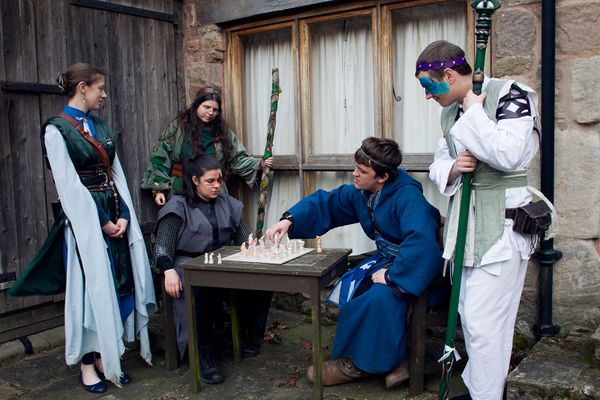Urizen people
No edit summary |
|||
| Line 23: | Line 23: | ||
===Sample names=== | ===Sample names=== | ||
Adula, Aeneas, Alba, Aquila, Belisari, Camilla, Cyrus, Drusus, Felix, Flavia, Florian, Hadrian, Julia, Livia, Majorian, Martina, Marcus, Megaris, Nicasia, Octavia, Octavius, Priscilla, Portia, Sabina, Seneca, Severus, Sophia, Tacitus, Tatiana, Vaanes, Valeria, Zeno. | Adula, Aeneas, Alba, Aquila, Belisari, Camilla, Cyrus, Drusus, Felix, Flavia, Florian, Hadrian, Julia, Livia, Majorian, Martina, Marcus, Megaris, Nicasia, Octavia, Octavius, Priscilla, Portia, Sabina, Seneca, Severus, Sophia, Tacitus, Tatiana, Vaanes, Valeria, Zeno. | ||
N.B. Whilst some names are inspired by real world names which may be given to specific genders, Empire is a gender blind setting and people of any gender choose any name they like that is appropriate to their nation. | |||
===Naming resources=== | ===Naming resources=== | ||
Revision as of 17:37, 14 May 2020
All people by nature desire knowledge.

The Urizen live in the mountains in settlements called spires: clusters of buildings, halls, galleries, and balconies that are carved into a hilltop or the side of a mountain peak. Spires tend to specialise: a given spire might be known for its fine craftsmanship, the beauty and artistry of its musicians, its dedication to martial affairs, or its mastery of one or more spheres of magical power.
These majestic peaks have shaped Urizen society. They are defensible, but can only support a small population. As a result, Urizen is the smallest nation in terms of population, although its numbers have been slowly increasing since it joined the Empire. The small size gives every person a clear sense of their own importance and their place in the community. The Urizen philosophers claim that the high peaks allow them to maintain a sense of perspective on the world, giving them a physical distance from the turmoil of day-to-day life in the Empire that they need to be able to consider problems dispassionately.
The Urizen prize rationality and learning above all other qualities. They favour an ordered approach to life and their culture is shaped by the philosophies and ideals they have embraced. They are an ambitious people with a desire for perfection in all things and most Urizen spend what time they can in study, contemplation, and practice. Scholars and philosophers are prominent, but magic is considered the highest discipline of all in Urizen and their most prominent citizens are usually powerful mages.
Urizen love to see practical applications of knowledge, lore, and philosophy. While learning for its own sake is laudable, the Urizen value much more highly knowledge that is used to create tangible benefit – to change the world, even in a small way. They are credited with creating whole branches of natural philosophy and mathematics, formalising and codifying ideas such as algebra, geometry, and trigonometry. They are most proud of practical inventions such as the telescope or the many magical rituals they have created. They apply their learning to make their lives more comfortable and fulfilling, and strive for the ideal of achieving something elegantly and with the least expenditure of effort.
Urizen aspires to a sense of timeless tranquillity. They seek to cultivate serenity and calm in themselves and in their environment. Most Urizen live a structured life that provides a foundation for them to build their identities around. They are not moribund or calcified, but disruption of the personal daily routine is a clear sign that there are problems that demand their attention.
A desire for order and perfection in all things is what drives most Urizen. They seek mastery of the self, often through philosophies such as Arete and Poise, and they employ the teachings of the Net of the Heavens to make the world around them flawless and sublime. Most strive to move the Empire towards a utopia. While different spires disagree on what constitutes the perfect society, they broadly agree it should involve the largest amount of happiness for the largest number of people.
The archetypal Urizen is an educated person who applies their learning and discipline to every part of their life. An individual Urizen might easily be an implacable blade-master, oratorical reformer, dedicated natural philosopher, wise theologian or powerful magician. Wherever possible, they seek to expand their understanding of the world and their role within it, and apply that understanding to achieve their goals.
Names
Urizen names are inspired by Roman and Byzantine names. They do not use the classical Roman three part name, and comic pidgin Latin should not be used, but the classical roots give a single name the right air of timelessness.
Formally, all Urizen append the name of their spire to their title. Spires are small enough that the occupants can avoid naming children with names used by other living residents of the spire, so the Urizen have no need of family names. If two Urizen with the same name do end up living in the same spire then one or both of them are usually given an appropriate epithet by the peers, e.g. "Portia the younger".
Spire names tend to be in English, and are usually descriptive. For example; Evenspire, White Marble Spire, Spire of the Immaculates.
Sample names
Adula, Aeneas, Alba, Aquila, Belisari, Camilla, Cyrus, Drusus, Felix, Flavia, Florian, Hadrian, Julia, Livia, Majorian, Martina, Marcus, Megaris, Nicasia, Octavia, Octavius, Priscilla, Portia, Sabina, Seneca, Severus, Sophia, Tacitus, Tatiana, Vaanes, Valeria, Zeno.
N.B. Whilst some names are inspired by real world names which may be given to specific genders, Empire is a gender blind setting and people of any gender choose any name they like that is appropriate to their nation.
Naming resources
Further Reading
Core Brief
Additional Information
